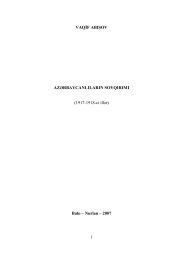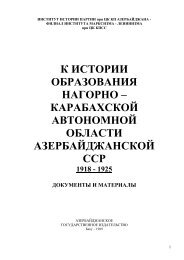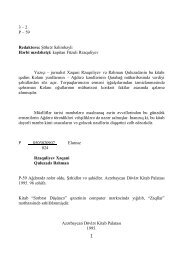ARMENIAN - Erevangala500
ARMENIAN - Erevangala500
ARMENIAN - Erevangala500
You also want an ePaper? Increase the reach of your titles
YUMPU automatically turns print PDFs into web optimized ePapers that Google loves.
Zealanders were wounded; and 7,594 Australians and<br />
2,431 NZs were killed. The final death-poll alone at the<br />
Gallipoli Campaign: 33,000 allied and 86,000 Ottoman<br />
troops died in the eight month fight campaign which<br />
achieved none o f its objectives.<br />
The Turkish nation who lost about 253,000 men at battle<br />
had managed to emerge in honour against the Allied<br />
forces.<br />
This was the biggest failure o f Winston Churchill and o f<br />
the Allies o f course. They had underestimated the military<br />
skills o f Mustafa Kemal Atatiirk and his brave soldiers.<br />
General map o f the Battle o f the Dardanelles which reached a<br />
high point in April 1915 but in fact lasted from March through<br />
into the autumn and constituted a permanent threat to the secu<br />
rity o f the capital o f the Ottoman Empire.<br />
The allied fleet began bombarding the Turkish batteries at<br />
the entrance to the Straits already 3rd November 1914<br />
and it continued intermittently until 12th March 1915.<br />
Having failed their own two offensives at the Caucasian<br />
front and at Suez the Ottomans were now faced with an<br />
offensive by the Allies. From the beginning o f 1915<br />
onwards it became evident, from intelligence reports o f<br />
enemy naval and troop movements that the French and<br />
the British Empire forces were assembling on the islands<br />
before the Dardanelles - mainly at Imbros.<br />
TH E A N G L O -F R E N C H A TTA C K ON<br />
CO N STA N TIN O PLE,<br />
TH R O U G H TH E N A R R O W S AND<br />
A C R O SS TH E SEA OF M A R M A R A , WAS<br />
N OW IM M IN EN T. DATE: A P R IL 24!<br />
The 18th March 1915 marks the real beginning of the Darda<br />
nelles campaign under the commander Admiral de Robeck.<br />
The mood o f the Turkish population o f Istanbul reached a<br />
low point. First the failures o f the Caucasian and<br />
Egyptian campaigns and now the threatening situation of<br />
the Ottoman capital... Some o f the people o f<br />
Constantinople, also from the remaining Turks, began to<br />
talk despondently about the capture o f the city as though<br />
it had already occured.<br />
Most o f the Turks who could afford it or had well situated<br />
relatives in Anatolia began to leave for inner Anatolia.<br />
The governement prepared two spezial trains for the<br />
Sultan and his entourage while the administration was<br />
ready for evacuation to Eskishehir where the gold o f the<br />
Ottoman Bank and the statetreasure had already been<br />
brought.<br />
These days o f danger produced two results, one outstanding<br />
and one which had to be expected as "normal".<br />
The right man at the right moment at the right place: Mustafa<br />
Kemal (bright uniform) with his abslutely loyal and enthusias<br />
tic staff o f the 3rd OttomanArmy.<br />
The outstanding event was the reappearance o f Enver<br />
Pasha, who had kept out o f the public eye since his defeat<br />
in the Caucasus. All at a sudden, he, the son in law o f the<br />
Sultan, behaved like a true Ottoman prince. He declared<br />
that the Allied forces would never succeed to gain the<br />
Dardanelles because the fortifications at the straights<br />
were impregnable. His behaviour was absolutely calm<br />
and confident and finally Enver was proved right.<br />
"Normal" was the attitude o f the Armenian citizens o f<br />
Constantinople. They were ready to fight - side by side<br />
with the Allies while the Greek community waited silently<br />
for the outcome o f the events.<br />
81

















